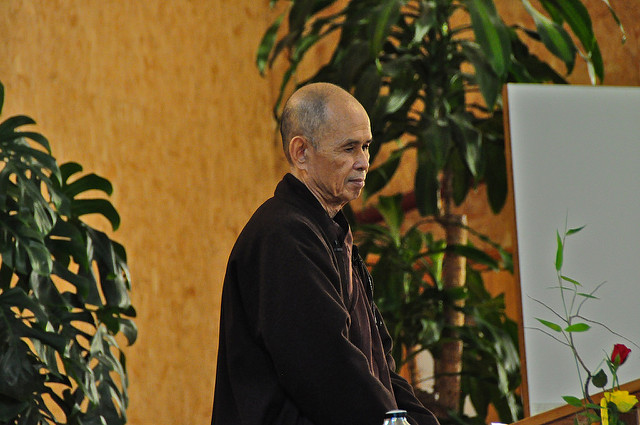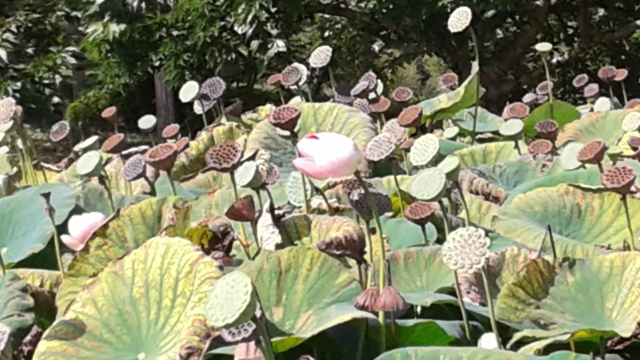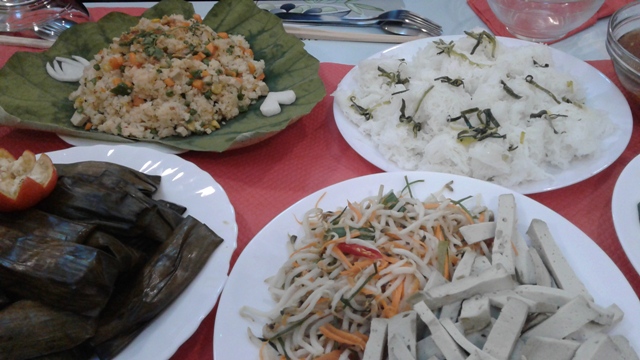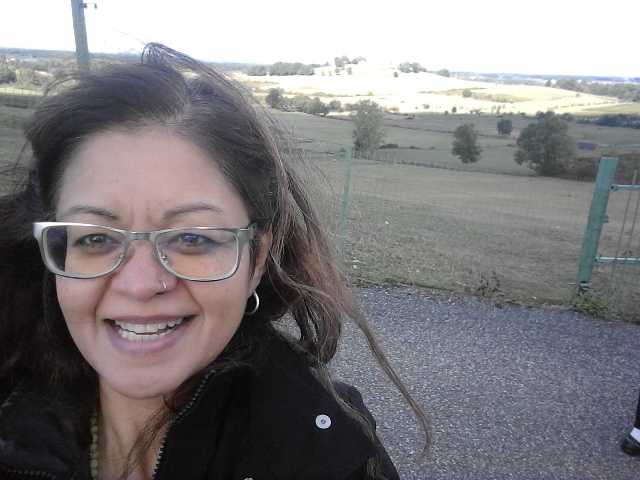
This past fall, one of my greatest dreams came true: I had the opportunity to visit Plum Village, Thích Nhất Hạnh’s home and monastery near Bordeaux, France.
It was almost shocking at first to see the simple way in which these peaceful, wise, smiling and playful, respectful, and intelligent nuns and monks live.
It took me almost three days out of my week-long stay, during which I shared a rustic, basic room with 11 other women of all ages and backgrounds, to begin to settle down, calm my mind, and truly enjoy my time and the unbelievably gorgeous countryside.
Over the week, I learned so much from being around the nuns and monks, practicing daily, and attending dharma talks and ceremonies with the community.
Each ceremony—like “Beginning Anew,” “Touching the Earth,” and a ceremony dedicated to reciting sutras—touched me deeply, even the ones in Vietnamese. There was something special about the tone in the voices and the kindness and reverence of the monastics. Some of my fellow participants didn’t agree and were annoyed by the use of Vietnamese, sometimes with no translation, and the “slowness” of the ceremonies. However, the nuns weren’t phased at all by this and continued to treat them with kindness.
The monastics come from many countries, including Vietnam and Europe, and some of them are only in their late teens. They live so simply, with a vegan diet, growing their own food on the “happy farm,” limiting their use of technology, and harvesting delicious and abundant fresh plums—to be later made into dried fruit and jam for all to enjoy.
This way of life was hard for me to get used to, and my inner business analyst wanted to improve things in the kitchen and make everything more efficient—until I realized this is exactly how they wanted to live. In this community, they practice mindfulness in everyday life. Slowing things down gives them a chance to truly experience each moment as it is.
Their routine included waking at 4:30 a.m. with meditation, chanting, movement, organizing days of mindfulness and future retreats, and mindful work duties. The big surprise came on Monday—“lazy day”—when most of the nuns had time off, all routines and formal practice stopped, and the nuns simply relaxed and strolled around the monastery, walking, chatting, giggling, and eating figs and plums. How shocking, yet wonderful! They even demonstrated relaxing mindfully.

This is one of the many lotus ponds—flowers are grown not just for their beauty and the reminder of mindfulness, even in the mud, but also to make lotus tea and cultivate lotus roots for scrumptious soups and salads.

Delicious vegan food from a wedding feast for Sr. Chan Khong’s nephew and new bride.
Some of the lessons I learned during this visit subtly snuck up on me, as insights do, while doing something as simple as going for a walk or getting dressed. Others were more dramatic and emotional—they hit me hard:
1. We can only completely forgive others once we have healed the wounds within ourselves.
Otherwise, we will continue to be triggered and feel emotional pain during intense interactions with difficult people in our lives. This was the answer from a sister when asked about a participant’s painful emotions about an ex-abuser. Any one of us can relate to dealing with difficult people and feeling helpless.
2. It is possible to practice for our family, friends, and others who have suffered, in order to help transform them.
We know there are people in our lives who could use a dose of mindfulness—but may never find their way to this practice. The sisters talked about ways to energetically share good intentions and benefits from our practice with others who are in need.
3. Those who hurt us are suffering, so as best you can, give them love and understanding to help them transform.
I don’t know about you, but this is a tough one for me. This is my take on one of the sutras on dealing with anger. Essentially, it describes finding the tiniest shred of goodness in everyone and using that as a focus. If no goodness is to be found, then focus on the fact that they are suffering to develop compassion for them.
4. Be present. Come back to yourself, bringing awareness to your breath and body sensations, especially during difficult times.
Coming back to ourselves is really the answer to it all. If we can do this—come back to ourselves in the present moment—we have choices, not to react, but to respond more wisely. The monastics talked a lot about this. They were obviously also struggling at times, dealing with old demons, this seemingly ideal yet difficult way of life, and transforming their own suffering.

I am still processing these teachings and figuring out how to put them into practice.
I recognize that I am not perfect, only human.
As Thích Nhất Hạnh says, “I am only a part time Buddha, not a full time Buddha.” Like other human beings, at the best of times I can be compassionate toward others or at least empathetic, but when I am under stress, feeling ill, or tired, this is difficult.
After having taken the Mindful Self-Compassion course and sitting in multiple 10-day silent retreats, I realized what I really needed was compassion for myself first. Strangely, I was being hard on myself—feeling guilty and responsible for events and circumstances that were out of my control. I was also beating myself up for making mistakes. Once I learned practices that allowed me to be kinder to myself, to be more mindful, and to recognize my common humanity, I was better able to let go of guilt, anger, shame, and frustration, and make wiser decisions from a place of calm and resilience.
This, of course, does not happen all the time, but when I lose it or have a meltdown, I now have the tools to deal with these strong emotions. This is all thanks to my mindfulness practice, my teachers, supportive friends, and to self-compassion.
I hope you enjoy this poem excerpt, “Kindness,” by Naomi Shihab Nye, from Words Under the Words: Selected Poems.
Before you know kindness as the deepest thing inside,
you must know sorrow as the other deepest thing.
You must wake up with sorrow.
You must speak to it till your voice
catches the thread of all sorrows
and you see the size of the cloth.
Then it is only kindness that makes sense anymore,
only kindness that ties your shoes
and sends you out into the day to gaze at bread,
only kindness that raises its head
from the crowd of the world to say
It is I you have been looking for,
and then goes with you everywhere
like a shadow or a friend.
you must know sorrow as the other deepest thing.
You must wake up with sorrow.
You must speak to it till your voice
catches the thread of all sorrows
and you see the size of the cloth.
Then it is only kindness that makes sense anymore,
only kindness that ties your shoes
and sends you out into the day to gaze at bread,
only kindness that raises its head
from the crowd of the world to say
It is I you have been looking for,
and then goes with you everywhere
like a shadow or a friend.
~
Author: Rose Mina Munjee
Images: Author’s Own; Geoff Livingston/Flickr
Images: Author’s Own; Geoff Livingston/Flickr

No comments:
Post a Comment